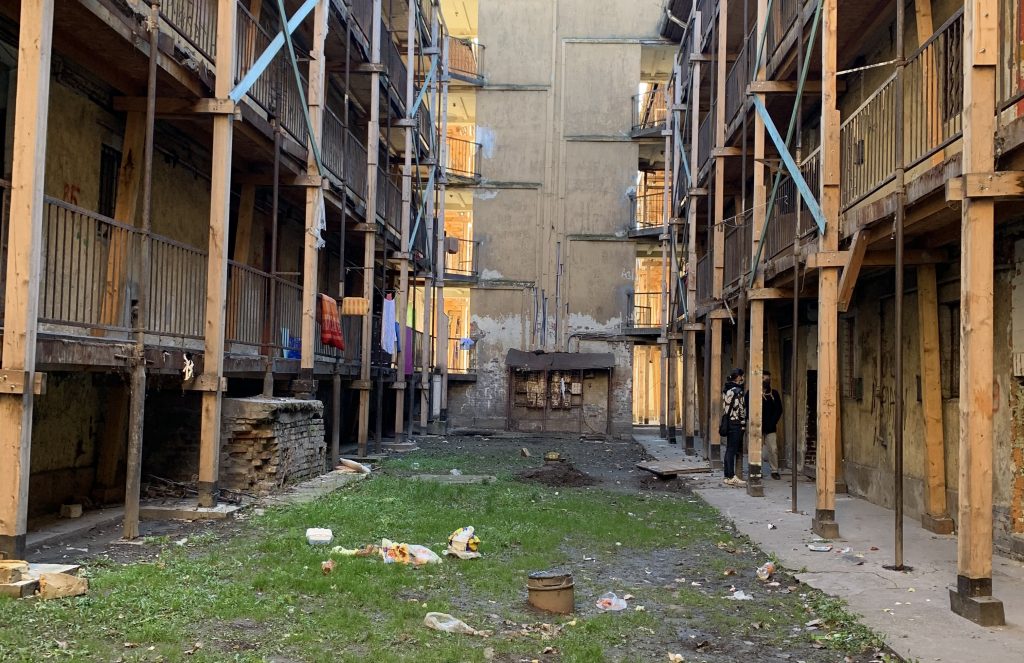The https://english.atlatszo.hu use cookies to track and profile customers such as action tags and pixel tracking on our website to assist our marketing. On our website we use technical, analytical, marketing and preference cookies. These are necessary for our site to work properly and to give us inforamation about how our site is used. See Cookies Policy
The deadline was the end of 2020, but the infamous blocks in Hős Street are still standing
Originally the deadline for the 2,1 billion HUF (5,8 million €) non-refundable government aid that the municipality of Kőbánya has received for the demolition of the two blocks in Hős Street was the end of 2020. We wanted to know how much money has been spent until now, and what is going on currently in the building.

The neighbourhood of Hős Street, situated in Kőbánya, disctict X. in Budapest has become infamous in recent years as it continously degraded and by now, is mostly known for drug abuse, crimes and other social problems connected to poverty. The two blocks are considered to be among the few remaining slum-like neighborhoods in Budapest.
The media often depicts the neighbourhood as a dangerous area, and it is true that there are a lot of problems there, but also, most of the residents are ordinary people who are stuck in these decaying blocks and who would like to move out, if they could make a proper agreement with the municipality.
The background of the story is that in 2017 the district has decided to demolish the two blocks 15/A-B in Hős Street and to evict the owners by buying them out of their properties. In order to do that effectively, the Ministry of Interior has given them a non-refundable government aid. Out of the 2.1 billion forints, about 1.1 billion can be used to purchase the properties and compensate the evicted families. Another 225 million can be used for renovation and buying new apartments, and 96 million can be used to buy rental rights.
Originally there was a one year deadline but later it was extended by another year, until 31 December 2020.
So far only half of the money has been spent
The municipality didn’t asnwer to our question regarding the completion of the demolition. They stated that the conciliation process is unpredictable, so they cannot provide a schedule right now. On the annual public hearing of the district council, organised online due to the pandemic in November, the mayor from the Fidesz party, Antal Róbert Kovács D. stated that a significant amount of the money has been used up.
However, if we look at the data provided by the municipality itself, we can see that so far only half of the money has been spent, approximately 1,2 billion HUF.
Most of it (607 million HUF) was spent on real estate purchase and renovation in order to provide a home for the residents of the block.
We also contacted the mayor who explained that because of the coronavirus pandemic and the state of emergency, all programs implemented with support from the central budget will be extended by 80 days. This means that the deadline of the demolition will be extended from 31 December 2020 to 29 June 2021. However, given the fact that the municiplaity of Kőbánya has only managed to use half of the money in 3 years, it remains a question if the they could finish the process in the next six months.
We also managed to go on-site with a local NGO called Kontúr Egyesület who represent the tenants and the owners of Hős Street. In spite of the fact that street is peaceful and there is a large green area between the blocks, the building itself is clearly in a terrible condition: building B looks much worse than the other block, with windows torn apart from the window frame and apartments completely walled-up.
The problems won’t disappear, they just move elsewhere
In the two blocks, half of the apartments belong to the property of the municipality, which has been empty and officially unused for more than 10 years. However, the problem of illegal occupants is particularly serious in these apartments: they move in to the unused properties without paying any rent, or just stay there for a few days while they are under the influence of some drugs.
The other half of the 122 apartments are private property, which means that for the demolition, a deal had to be made with the owners too. The municipality offered 4-6 million HUF for each apartments, however most of the owners didn’t accept the money because it is not enough to buy another apartment in Budapest. In comparison, in district VIII. which also has some slum-like areas, the price of a 25-30 m2 apartment is around 10-15 million HUF.
The mayor justified the amount of money that the district offers to the owners by saying that the Hős utca is the cheapest area of Budapest, according to analysis, one m2 costs on average 75 thousand forints here. However, according to the local NGO, mostly people with poor financial conditions live in the area, so it should have been the number one priority to provide safe housing conditions for them in order to prevent the residents from losing their homes.
As they see it, the biggest problem is the lack of a concept, as in this way poverty and the problems arising from it will not be solved, in fact, they will only move to other districts and rural cities.
The common cost is extremely high
We also managed to speak with some of the residents who are living in the block for more than 10 years. One of them mentioned that everyone thinks that only criminals, drug addicts or prostitutes are living in the area, however this is not true. The other resident agreed with this statement, adding that „Only those who have suffered silently from what was going on in Hős utca have stayed until now.”
The municipality has offered both of them approximately 4,5-5,6 million HUF for their appartements. They didn’t take the deal because they couldn’t afford to buy another apartment in Budapest from such small amount of money, and they refuse to move to the countryside as their work and their family tie them to the capital.
Another resident began to talk about the walling of the unused apartments. According to him, only 3-4 apartments were walled up but the other 30 remained in the same condition than before. It is a problem because there will be really cold in these rooms in winter, so the neighbouring apartments will have to pay much more for heating.
Another interesting thing is that the amount of common cost is relatively high in Hős Street: according to Magyar Narancs, the common cost was 9 and 25 thousand forint each month two years ago, depending whether there is a water meter in the apartment or not. One of the residents confirmed these numbers: they pay approximately 12 thousand forint for a 25 m2 apartment with a water meter.
The amount is high because of the fact that the house has huge debts. That’s why from the 2.1 billion, more than 200 million HUF has been spent so far to settle debts and pay the common costs of the blocks, but in spite of this, the amount of the common costs has not been reduced yet.
„They live in a crumbling building which they soon have to leave, and still, and their common cost is much higher than anyone else in the city.”
– added the president of Kontúr, Zsuzsanna Molnár.
Written and translated by Zita Szopkó. The original article can be found here.

Share:
Your support matters. Your donation helps us to uncover the truth.
- PayPal
- Bank transfer
- Patreon
- Benevity
Support our work with a PayPal donation to the Átlátszónet Foundation! Thank you.
Support our work by bank transfer to the account of the Átlátszónet Foundation. Please add in the comments: “Donation”
Beneficiary: Átlátszónet Alapítvány, bank name and address: Raiffeisen Bank, H-1054 Budapest, Akadémia utca 6.
EUR: IBAN HU36 1201 1265 0142 5189 0040 0002
USD: IBAN HU36 1201 1265 0142 5189 0050 0009
HUF: IBAN HU78 1201 1265 0142 5189 0030 0005
SWIFT: UBRTHUHB
Be a follower on Patreon
Support us on Benevity!





